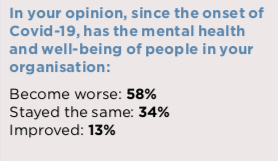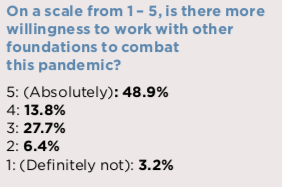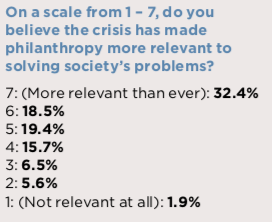More than half of respondents to an Alliance survey reported that the mental health and well-being of people in their organisation has deteriorated since the Covid-19 pandemic started.
This is one of the key findings of Alliance’s annual survey, published today ahead of Alliance’s new issue on health philanthropy, which looked at the impact of the pandemic on the philanthropy sector.
The survey, which collected 250 responses from philanthropy professionals and practitioners in 59 countries, also highlighted more appetite for collaboration, a greater willingness to provide unrestricted funding and a view that the Covid-19 pandemic has made philanthropy more relevant than ever to addressing society’s problems.
 But it is the concerns about the mental health toll that may be of particular concern to sector leaders. when asked whether ‘the mental health and well-being of people in your organisation has become worse, stayed the same or improved’ since the onset of Covid-19, a remarkable fifty-eight per cent of respondents reported a decline in mental health.
But it is the concerns about the mental health toll that may be of particular concern to sector leaders. when asked whether ‘the mental health and well-being of people in your organisation has become worse, stayed the same or improved’ since the onset of Covid-19, a remarkable fifty-eight per cent of respondents reported a decline in mental health.
‘It is certainly the case that employees are under an unsustainable amount of pressure’, noted one respondent.
In a comment to Alliance after reviewing the survey findings, the Center for Effective Philanthropy President Phil Buchanan said: ‘The mental health challenges related to the anxiety, grief, and uncertainty of the pandemic and related crises are huge and deserve the attention of every organisational leader. It’s important for leaders to create spaces for staff to connect and share worries, to continually remind staff of resources for those who need professional help, and to acknowledge the challenges by being vulnerable themselves. Finally, it’s crucial to pay special attention to those who may be especially impacted by the crises of 2020, including staff of colour, parents, those caring for elderly family, those who are immunocompromised, and the list goes on. If ever there was a time for leaders and managers to offer flexibility and show people compassion, it is now.’

New priorities
Other key findings revealed greater backing for health, gender equality and racial justice causes. Thirty-nine per cent of respondents said they were giving more priority to health, 28 per cent to gender equality and 19 per cent to racial justice suggesting increased philanthropic action in response to social movements like #MeToo and Black Lives Matter.
‘We are now changing our strategies to incorporate new assumptions and contexts, including the pending political, social and economic crisis, changed priorities in local communities we support and the ever-changing short term and long-term developments and effects of the pandemic’, one respondent shared.
Have your funding priorities changed this year? Are you giving more to the following?
- Health (including mental health): 39%
- Gender equality: 28%
- Racial justice: 19%
- Climate change: 12%
- Democracy education: 9%
While many respondents welcomed greater attention to health in the context of Covid-19, some expressed concerns that funding was ameliorative and would do little to address structural problems with one noting ‘Many foundations have shifted their giving to responding to the immediate public health challenge. Very few are focused on addressing the root causes of the problem’, said one respondent.
Another replied: ‘Grantees are telling us that they have welcomed foundations’ emergency responses, but that they are seriously concerned about the long-term impacts of Covid on the funding landscape. Many of them will not last beyond this financial year unless emergency funding is followed up with something more long term.’

Flexible funding but maintaining endowments
Some of the emergency responses include a greater willingness for collaboration and providing unrestricted funding – 60 per cent of survey respondents indicated they had made more of their funding core, and 48.9 per cent reported there was more willingness to work with other foundations to combat the pandemic.
Sharing thoughts on this survey finding, Buchanan argued that foundation should ‘flex spending levels’ in response to current challenges arguing that foundations can afford to give more: ‘Foundations, by virtue of their long-time horizons, have a unique opportunity to be counter-cyclical forces when nonprofits are challenged. Equity markets have done surprisingly well during this time – foundations can afford to spend more than they had planned without jeopardising their ability to exist into the future. The goal should not be to be the largest possible foundation, but to have the greatest possible impact. That will require flexing spending levels to the context and challenges of the day.’
 ‘The Covid-19 disruption provides an opportunity for foundations to change for the better – e.g. more core funding, longer grants, shifting power in decision-making, shifting power by re-distributing its capital (e.g. through racial justice reparations). ‘Build back better’ doesn’t just apply to the things foundations fund – it should also apply to foundations themselves’, said one respondent.
‘The Covid-19 disruption provides an opportunity for foundations to change for the better – e.g. more core funding, longer grants, shifting power in decision-making, shifting power by re-distributing its capital (e.g. through racial justice reparations). ‘Build back better’ doesn’t just apply to the things foundations fund – it should also apply to foundations themselves’, said one respondent.
‘We have created, in partnership with two other organisations, an Emergency Fund for Health. We raised $8 million, through more than 10,000 donors. This amount has been donated to 61 hospitals spread among 25 of Brazil’s 27 states. We had never done anything like this before’, said another.
Though overall, respondents reported more flexible and responsive funding, they also indicated that protecting endowments was ‘very important’ in approaching their funding work this year. When asked ‘If you work for a foundation, how important do you think it should be for your foundation to protect the long-term value of its endowment?’, 56 per cent of respondents said ‘very important’ and 34 per cent said ‘somewhat important’, with only 12 per cent replying ‘not important’.
 The survey also found that many believed the Covid-19 health crisis has made philanthropy more relevant to solving societies problems. This role for the sector was met with mixed reactions with one British respondent sharing, ‘Whilst I think there has been good stuff going on, I think we still need to question why philanthropy is required to step in to such a dramatic extent. Years of underinvestment and an aversion to the charity sector by the UK government have left millions in an even more vulnerable position.’
The survey also found that many believed the Covid-19 health crisis has made philanthropy more relevant to solving societies problems. This role for the sector was met with mixed reactions with one British respondent sharing, ‘Whilst I think there has been good stuff going on, I think we still need to question why philanthropy is required to step in to such a dramatic extent. Years of underinvestment and an aversion to the charity sector by the UK government have left millions in an even more vulnerable position.’
Another commented, ‘Both the presence and importance of the philanthropic sector is getting bigger more than ever all over the world. On the flip side, however, people like to support projects with direct and easy-to-understand impact, and then, the philanthropic sector might hesitate to take risks, and work on projects with foresight but may lack concrete evidence or foundation to success.’
‘The pandemic was a huge opportunity to the organisations of civil society to show their power, their capacity to face complex problems, to react fast, to raise funds and to help people everywhere. The pandemic made civil society stronger’, said yet another.
Other insights from the Alliance survey
On funding practice
‘We were quite excited by the innovation to allow WhatsApp voice notes as the grant application process for seed projects in response to Covid-19. The communities felt very included in processes that are usually out of reach for them.’
‘We have created a First Nations Funders Working Group. The urgency of the pandemic instigated this group however it will continue beyond with the momentum created to ensure voices of First Nations peoples are heard in their communities, across our nation and to our government leaders.’
Comments from around the world
‘As an association, we are aware of our members’ initiatives in response to Covid-19 and they have many inspiring ones. For example, Tanoto Foundation went above and beyond to ship tons of PPE from China to Indonesia and give them to health workers. Tzu Chi Foundation also worked with business owners and corporations to pool fund and donate them to hospitals and those affected by the pandemic. Filantropi Indonesia also created a temporary task force to create and publish guidelines for volunteers and provide protection (insurance) to the volunteers working on various Covid-19 initiatives.’
‘There was an initial excitement about doing things differently, but in the last three months it seems the pace has trebled and more of the same is flooding the sector and this is worrying both for the wellbeing of staff, the wellbeing of communities we partner with as more activities are pushed without supporting the space for reflection and processing this intense shift to the way we are together, and the very big systemic questions being asked. We fear that we are rushing into a ‘new normal’ without sitting in the deep questions across the board about how abnormally we’ve been operating for quite a while. The next disruption like this may be more violent if we don’t take the time to undo some of the unhealthy patterns we have as a sector.’
‘The philanthropy sector in Indonesia has responded positively since the pandemic started. Not just big foundations and corporations, but also individuals who are able to help others through online crowdfunding platforms. This proves that civil society has tremendous power to create change. There are many creative and innovative ways that also came up during the pandemic involving technology. That means we need to embrace this new normal and adapt using the technology we have (or don’t have yet) to keep building up our society.’
‘There’s been great mobilisation from all sectors, but since about July, even though the consequences of the pandemic are not over yet, contributions have fallen drastically, as foundations and civil society felt they had done enough. With such scenario, we fear for the future.’
For more on mental health and philanthropy’s response to the Covid-19 pandemic, subscribe to receive Alliance’s upcoming issue on global health philanthropy.
Subscribe today to make sure not to miss it!
At £46 billion each year – almost a quarter of all grantmaking – philanthropy spends more on health-related causes than anything else. As the Covid-19 pandemic intensified, philanthropy provided critical funding for vaccine development, medical equipment, mutual aid, social welfare, and global health infrastructure. But there is intense debate about how the largest foundations interact with governments, international bodies and pharmaceutical companies and how they should be held accountable to citizens. This issue of Alliance considers new directions for global health philanthropy and explores whether health funding is going where its most needed. It is guest edited by Julia Greenberg, Director, Governance and Financing, Public Health program, Open Society Foundations and Aggrey Aluso, Manager of Health and Rights Program, Open Society Initiative for Eastern Africa.





Comments (1)
Mental health issues are on the rise in the global philanthropy sector, with one in five people in the sector reporting a mental health problem. The stigma surrounding mental health means that many people don’t seek help, which can have serious consequences for both their physical and emotional wellbeing.